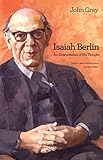Isaiah Berlin : An Interpretation of His Thought / John Gray.
Material type: TextPublisher: Princeton, NJ : Princeton University Press, [2020]Copyright date: ©2013Description: 1 online resource (240 p.)Content type:
TextPublisher: Princeton, NJ : Princeton University Press, [2020]Copyright date: ©2013Description: 1 online resource (240 p.)Content type: - 9780691157429
- 9780691213385
- Political science -- Great Britain
- PHILOSOPHY / Political
- Aristotle
- Burke, Edmund
- Christianity
- Fichte, Johann
- Hampshire, Stuart
- Hegel, Georg
- Kant, Immanuel
- Locke, John
- Marx, Karl
- Oxford
- Rawls, John
- agonistic liberalism
- anthropology
- autonomy
- commonality
- determinism
- empiricism
- equality
- expressivism
- freedom
- goods
- human flourishing
- indeterminacy
- irrationalism
- moral philosophy
- natural law
- naturalism
- perfectionism
- scepticism
- science
- self-transformation
- toleration
- will
- 320.092 23
- JC257.B47 .G739 2013
- online - DeGruyter
- Issued also in print.
| Item type | Current library | Call number | URL | Status | Notes | Barcode | |
|---|---|---|---|---|---|---|---|
 eBook
eBook
|
Biblioteca "Angelicum" Pont. Univ. S.Tommaso d'Aquino Nuvola online | online - DeGruyter (Browse shelf(Opens below)) | Online access | Not for loan (Accesso limitato) | Accesso per gli utenti autorizzati / Access for authorized users | (dgr)9780691213385 |
Browsing Biblioteca "Angelicum" Pont. Univ. S.Tommaso d'Aquino shelves, Shelving location: Nuvola online Close shelf browser (Hides shelf browser)

|

|

|

|

|

|

|
||
| online - DeGruyter The I and the Not-I : A Study in the Development of Consciousness / | online - DeGruyter Ornamentation in Baroque and Post-Baroque Music, with Special Emphasis on J.S. Bach / | online - DeGruyter Goethe, Volume 9 : Wilhelm Meister's Apprenticeship / | online - DeGruyter Isaiah Berlin : An Interpretation of His Thought / | online - DeGruyter Chinese Primer : Character Text (Pinyin) / | online - DeGruyter Bravura : Virtuosity and Ambition in Early Modern European Painting / | online - DeGruyter Renewal : From Crisis to Transformation in Our Lives, Work, and Politics / |
Frontmatter -- Contents -- Acknowledgements -- Introduction to the New Edition -- Introduction to the Original Edition -- 1. The Idea of Freedom -- 2. Pluralism -- 3. History -- 4. Nationalism -- 5. Romanticism and the Counter-Enlightenment -- 6. Agonistic Liberalism -- Notes -- Concise Bibliography of Berlin's Work -- Index
restricted access online access with authorization star
http://purl.org/coar/access_right/c_16ec
Isaiah Berlin (1909-1997) was the greatest intellectual historian of the twentieth century. But his work also made an original and important contribution to moral and political philosophy and to liberal theory. In 1921, at the age of eleven, Isaiah Berlin arrived in England from Riga, Latvia. By the time he was thirty he was at the heart of British intellectual life. He has remained its commanding presence ever since, and few would dispute that he was one of Britain's greatest thinkers. His reputation extends worldwide--as a great conversationalist, intellectual historian, and man of letters. He has been called the century's most inspired reader. Yet Berlin's contributions to thought--in particular to moral and political philosophy, and to liberal theory--are little understood, and surprisingly neglected by the academic world. In this book, they are shown to be animated by a single, powerful, subversive idea: value-pluralism which affirms the reality of a deep conflict between ultimate human values that reason cannot resolve. Though bracingly clear-headed, humane and realist, Berlin's value-pluralism runs against the dominant Western traditions, secular and religious, which avow an ultimate harmony of values. It supports a highly distinctive restatement of liberalism in Berlin's work--an agnostic liberalism, which is founded not on rational choice but on the radical choices we make when faced with intractable dilemmas. It is this new statement of liberalism, the central subject of John Gray's lively and lucid book, which gives the liberal intellectual tradition a new lease on life, a new source of life, and which comprises Berlin's central and enduring legacy. In a new introduction, Gray argues that, in a world in which human freedom has spread more slowly than democracy, Berlin's account of liberty and basic decency is more instructive and useful than ever.
Issued also in print.
Mode of access: Internet via World Wide Web.
In English.
Description based on online resource; title from PDF title page (publisher's Web site, viewed 02. Feb 2021)


